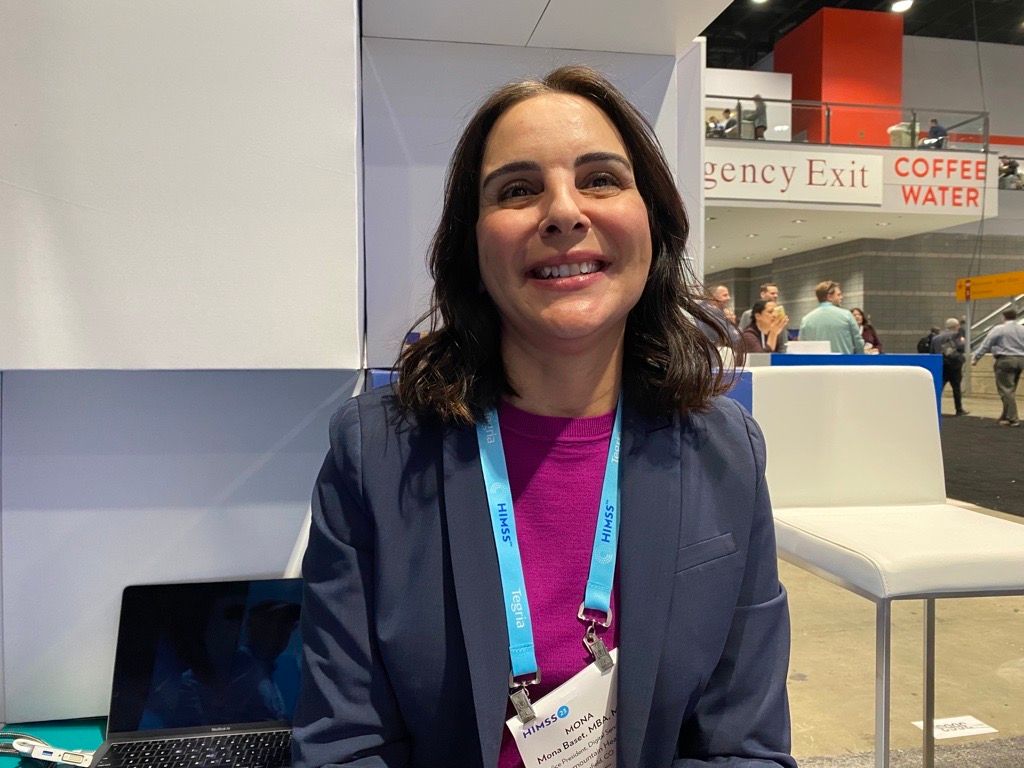Improving the patient experience: ‘Healthcare doesn’t get a pass anymore’
Consumers are seeing more ease and convenience in other aspects of their lives, and they want it from health systems, according to Mona Baset of Intermountain Health.
Mona Baset, vice president of digital services for Intermountain Health, spoke about the patient experience at the HIMSS Conference. (Photo: Ron Southwick)

In the healthcare industry, brand loyalty can no longer be assumed.
Patients have alternatives for health services and treatment, and they will use them, says Mona Baset, the vice president of digital services for Intermountain Health.
“People have options now,” Baset says. “It isn't that they're stuck with a provider, or stuck with a health system. They have a lot more choices. And they're going to pick the easiest thing that they can afford. And we have to be ready for that.”
In an interview at the HIMSS Global Health Conference & Exhibition, Baset spoke with Chief Healthcare Executive® about some of the steps Intermountain is taking to improve the patient experience. She also talked about steps other hospitals and health systems should be taking to make it easier for patients to get the care they need.
In short, as Baset says, “Healthcare doesn't get a pass anymore.”
(See part of our conversation with Mona Baset of Intermountain Health in this video. The story continues below.)
‘They will just leave’
With more non-traditional healthcare rivals such as Amazon, Walmart, CVS Health, and others, patients are seeing more places to get care when and how they want it.
Baset says she saw the marketing materials from a disruptor touting the ability to get an appointment whenever patients wanted, without waiting in a waiting room.
“There’s a lot of research out there that shows how easily a patient will switch providers if the access is difficult, or if the experience is high effort,” Baset says. “They will just leave and they'll go somewhere else. And as an industry, we look around and we see some of those disruptions are coming into the picture, and have been coming into the picture.”
When the COVID-19 pandemic began in early 2020, consumers saw how different industries adapted to stay afloat. Healthcare responded as well, with the expansion of telehealth and hospital-at-home programs.
“Things that we had been thinking about for months, years, were able to be implemented,” Baset says, “And it was incredible.”
However, advances in healthcare and other industries have also raised consumer expectations. As Baset says, consumers are seeing how easy it is to use services such as DoorDash and are wondering why they can’t have that convenience from their health systems.
The health system is also in the midst of revamping its contact center and will be making it easier for agents to pull up information on patients who are calling with questions. Eventually, the contact center agents will be able to pull up information on known patients. If a parent is trying to schedule an appointment for a child, Baset says, the agent will be able to look and see that the parent hasn’t had a physical recently and could offer to schedule an appointment.
“We have to give patients and consumers a choice on how to engage with us,” Baset says.
Improving access and guidance.
Intermountain is focused on improving access for patients, Baset says. The system is aiming to make it easier for patients to search online for providers for the issues they are having. So far, the improved scheduling system is available at SCL Health, which Intermountain acquired last year. Intermountain has teamed with Kyruus, a software company, to expand the system’s scheduling options.
Intermountain aims to launch a revamped and consolidated website for the entire health system later this year, she says.
In addition to improving access, Baset says Intermountain is aiming to offer more guidance to make it easier to navigate the health system.
“That's bringing patients through this health journey without them having to think about things, without them getting frustrated, really bringing them through step by step,” Baset says. “So they can really successfully go through that health journey and get what they need.”
The health system is also aiming to help clinicians, Baset says, reiterating a top priority of Intermountain Health CEO Rob Allen. In an interview with Chief Healthcare Executive in February, Allen said he is focusing on clinicians and aiming to simplify their work.
“So we have to be able to support our caregivers and give them the tools and all the resources they need to be able to help patients and consumers to get and get through that health journey,” Baset says.
The need to simplify
Much of Intermountain’s mission is to simplify the patient experience. Noting online scheduling options, Baset says it gets confusing to offer patients 50 types of visits. She says it’s critical to offer a limited number of options, so patients aren’t overwhelmed.
“Simplification is hard,” Baset says. “It's really, really hard. It takes a lot of discipline. It's somewhat painful because you have to let go of the way things used to be. We have found that it benefits our patients and caregivers exponentially.”
Hospitals and health systems need to keep simplicity in mind, Baset says.
“We really have to focus on creating those easy, low-effort, simple experiences, and focusing on simplifying everything across the board internally, externally,” Baset says.
“If you can be disciplined about that process, you will be able to create experiences for your patients and your caregivers that are easy, maybe even enjoyable, to help people get through those journeys.”
Telehealth faces a looming deadline in Washington | Healthy Bottom Line podcast
February 12th 2025Once again, the clock is ticking on waivers for telemedicine and hospital-at-home programs. Kyle Zebley of the American Telemedicine Association talks about the push on Congress and the White House.